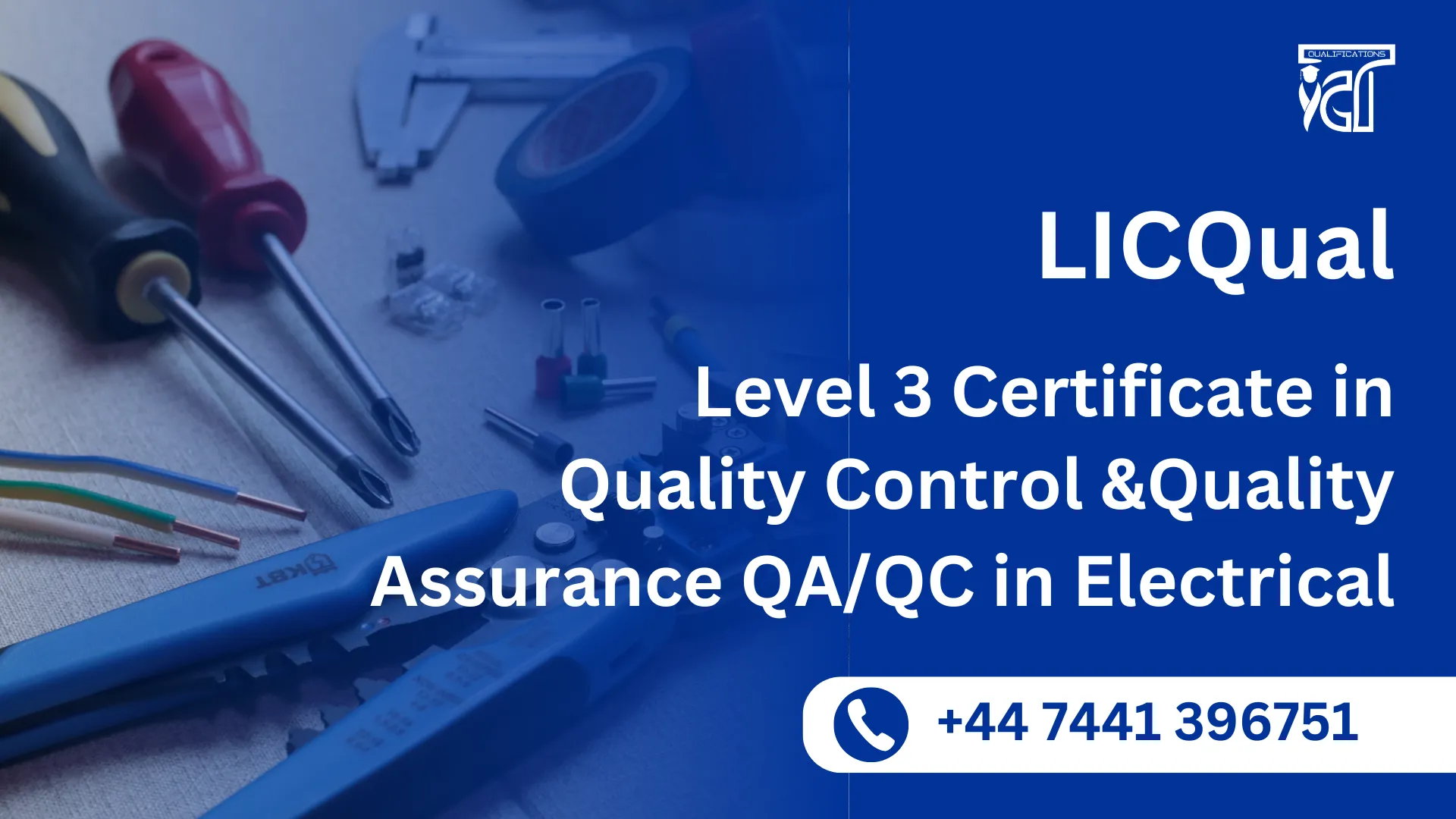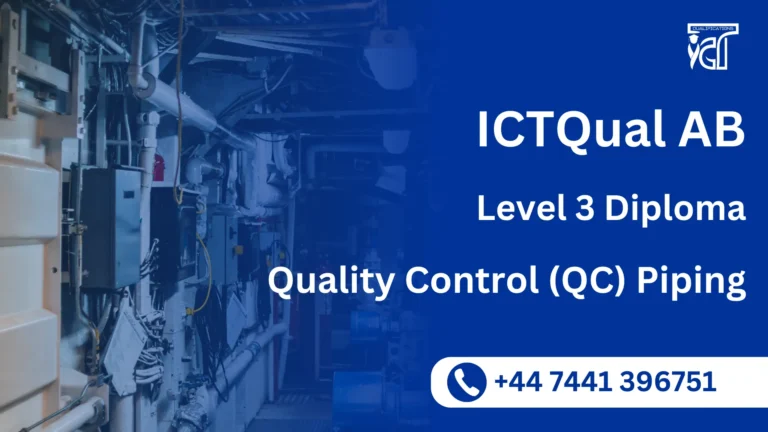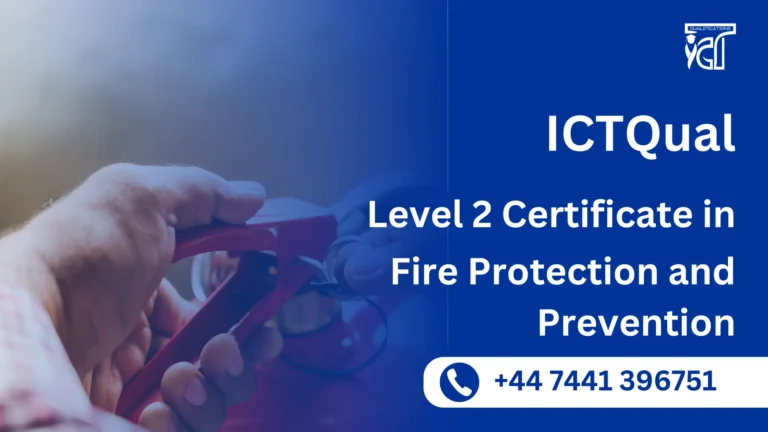The demand for quality control and quality assurance professionals in the electrical sector is growing rapidly as industries increasingly prioritize safety, precision, and compliance. The LICQual Level 3 Certificate in Quality Control and Quality Assurance (QA/QC) in Electrical is a highly practical, internationally recognized qualification designed to equip learners with the core skills required to implement and maintain electrical quality standards across industrial and construction projects.
Whether you are just starting your career or seeking to specialize in QA/QC for electrical systems, this Ofqual-regulated certificate provides a strong foundation to enhance your technical and professional competence.
The LICQual Level 3 Certificate in Quality Control and Quality Assurance in Electrical covers essential principles, tools, and practices needed to assess, monitor, and maintain quality in electrical installations and projects. This course is entirely assignment-based, providing a flexible and work-relevant learning experience. Delivered online, it is tailored for professionals and learners who want to study while balancing job or project responsibilities.
The curriculum combines theoretical knowledge with practical skills aligned with international standards, including IEC, ISO, and NEC codes, ensuring learners are job-ready upon completion.
The LICQual Level 3 Certificate in Quality Control and Quality Assurance (QA/QC) in Electrical is a powerful qualification for those who want to establish a strong career in electrical quality assurance. Combining practical knowledge, regulatory compliance, and flexible online delivery, this course ensures learners are ready to meet industry demands and safety standards.
Enroll today and take the next step toward becoming a certified electrical QA/QC professional.
LICQual Level 3 Certificate in Quality Control and Quality Assurance QA/QC in Electrical
Following are the mandatory units of LICQual Level 3 Certificate in Quality Control and Quality Assurance QA/QC in Electrical:
| Unit Ref# | Unit Title | Credit | GLH |
| LICQ2200141-1 | Introduction to Quality Control and Quality Assurance in Electrical | 4 | 20 |
| LICQ2200141-2 | Electrical Codes, Standards, and Regulations | 4 | 20 |
| LICQ2200141-3 | Testing and Inspection Techniques in Electrical QA/QC | 4 | 20 |
| LICQ2200141-4 | Quality Control for Electrical Components and Systems | 4 | 20 |
| LICQ2200141-5 | Statistical Analysis and Data Interpretation in Electrical QA/QC | 4 | 20 |
| LICQ2200141-6 | Documentation and Reporting in Electrical Quality Assurance | 4 | 20 |
GLH (Guided Learning Hours) and TQT (Total Qualification Time) are terms commonly used in vocational qualifications to help define the amount of time a learner is expected to spend on their studies.
1. GLH (Guided Learning Hours)
GLH refers to the number of hours a learner spends being directly taught, supervised, or supported during their course. This includes the time spent in activities such as:
- Classroom instruction
- Practical workshops
- One-on-one tutoring or mentoring sessions
- Online learning sessions with tutor support
In other words, GLH represents the time that learners are actively engaged with their instructors or learning activities.
2. TQT (Total Qualification Time)
TQT represents the total amount of time a learner is expected to invest in completing a qualification, including:
- GLH (Guided Learning Hours): Time spent on direct learning, as explained above.
- Self-Directed Learning: This includes time spent on independent study, research, assignment completion, preparation for exams, and any other work the learner does outside of direct teaching hours.
TQT is a broader measure that includes all the time required to achieve the qualification. It helps learners and employers understand the overall commitment required for the qualification.
Key Differences Between GLH and TQT:
- GLH focuses on direct learning with guidance or supervision.
- TQT includes GLH as well as independent study time and other learning-related activities.
Example:
If a qualification has a TQT of 600 hours and a GLH of 250 hours, it means the learner should spend 250 hours in direct learning (classroom, online, or tutor-led sessions) and 350 hours on independent study or research.
By the end of this course, learners will be able to:
Unit 1: Introduction to Quality Control and Quality Assurance in Mechanical Engineering
By the end of this unit, learners will be able to:
Introduction to Quality Control and Quality Assurance in Electrical
- Understand the core principles and concepts of Quality Control (QC) and Quality Assurance (QA) as applied in the electrical engineering field.
- Recognize the role of QA/QC in improving product quality, safety, and compliance in electrical systems and components.
- Develop an understanding of the difference between QA and QC and how they contribute to electrical product quality throughout the production process.
Electrical Codes, Standards, and Regulations
- Demonstrate knowledge of key electrical codes, industry standards, and regulations that govern electrical systems and products.
- Understand the importance of compliance with international, regional, and local standards such as ISO, IEC, and national electrical regulations.
- Apply knowledge of electrical codes and standards in real-world QA/QC processes, ensuring products meet legal and safety requirements.
Testing and Inspection Techniques in Electrical QA/QC
- Master various electrical testing and inspection techniques used to assess the quality and functionality of electrical components and systems.
- Develop proficiency in using testing tools and equipment to identify defects, ensure performance, and verify compliance with specifications.
- Learn how to interpret and document test results to support quality assurance decisions and corrective actions.
Quality Control for Electrical Components and Systems
- Apply Quality Control practices to monitor and control the quality of electrical components, systems, and assemblies.
- Implement quality checks and inspections at different stages of production to prevent defects and ensure reliability and safety.
- Learn to develop and execute quality control plans, including sampling, monitoring, and corrective actions for electrical products.
Statistical Analysis and Data Interpretation in Electrical QA/QC
- Understand the role of statistical analysis in QA/QC and how to apply statistical tools to monitor and improve electrical product quality.
- Develop the ability to interpret data collected from inspections and tests to identify trends, outliers, and areas for improvement.
- Use data-driven approaches to enhance the efficiency and effectiveness of quality assurance processes in electrical engineering.
Documentation and Reporting in Electrical Quality Assurance
- Learn the best practices for documenting quality assurance processes, inspections, and test results in compliance with industry standards.
- Understand the importance of maintaining accurate records and reports for audits, compliance verification, and continual improvement efforts.
- Develop the skills to create clear, concise, and effective QA/QC reports that communicate findings, corrective actions, and compliance status to stakeholders.
Benefits of the LICQual Level 3 Certificate in Quality Control and Quality Assurance (QA/QC) in Electrical
The LICQual Level 3 Certificate in QA/QC in Electrical is a career-focused qualification designed to equip learners with the essential skills and knowledge required to ensure quality and compliance in electrical systems. Whether you’re entering the field or looking to advance your technical profile, this certification offers numerous professional advantages.
1. Ofqual-Regulated and Internationally Recognized
This qualification is officially regulated, giving you the assurance of high educational standards and making your certification credible and widely accepted by employers around the world.
2. Tailored Specifically for the Electrical Sector
Unlike general quality control programs, this certificate focuses specifically on electrical QA/QC practices, making it highly relevant for technicians, inspectors, and engineers working in MEP, power, and industrial electrical systems.
3. 100% Assignment-Based – No Exams
Learners are assessed through practical assignments and real-world scenarios, not formal exams. This allows you to gain applicable skills without the stress of traditional testing.
4. Flexible Online Learning
Study from anywhere at your own pace. The course is delivered online with expert tutor support, making it ideal for working professionals and international learners.
5. Boosts Employability in High-Demand Roles
Completing this certification qualifies you for in-demand roles such as:
- Electrical QA/QC Inspector
- Quality Assurance Technician
- Site Quality Coordinator
- Testing & Commissioning Engineer
6. Hands-On, Practical Knowledge
The course emphasizes real-world application, including inspection techniques, non-conformance reporting, and compliance with IEC, NEC, and ISO standards.
7. Supports Health, Safety, and Regulatory Compliance
You’ll gain essential knowledge in HSE standards, electrical risk mitigation, and safe inspection practices—making you a valuable asset on any job site.
8. Suitable for a Wide Range of Industries
Applicable to sectors such as:
- Construction (Residential & Commercial)
- Oil & Gas
- Power Plants and Substations
- Manufacturing & Industrial Automation
- Renewable Energy Projects
9. Lays the Groundwork for Higher Qualifications
Graduates can seamlessly progress to more advanced training, including:
- LICQual Level 4 and 5 Diplomas in QA/QC
- ISO 9001:2015 Auditor Courses
- IOSH Safety Certifications
10. Enhances Professional Credibility
Holding this qualification demonstrates your commitment to quality, compliance, and continuous improvement, helping you stand out in the job market.
By completing the LICQual Level 3 Certificate in QA/QC (Electrical), you’re not just gaining a qualification—you’re building a career in electrical quality assurance with globally relevant, job-ready skills.
This diploma is ideal for:
- LICQual Level 3 Certificate in Quality Control and Quality Assurance QA/QC in Electrical is ideal for individuals seeking to advance their career in Quality Control (QC) and Quality Assurance (QA) within the electrical engineering industry.
- It is designed for professionals who want to develop a deep understanding of QA/QC principles and techniques specifically for electrical systems, components, and products.
- The LICQual Level 3 Certificate in Quality Control and Quality Assurance (QA/QC) in Electrical is perfect for those looking to transition into quality management roles or enhance their existing expertise in electrical engineering.
- This course is suited for quality engineers, inspectors, technicians, and managers who wish to strengthen their skills in managing quality assurance processes, product testing, and compliance with industry standards in the electrical field.
- LICQual Level 3 Certificate in Quality Control and Quality Assurance QA/QC in Electrical is also ideal for individuals with a technical background in electrical engineering who want to formalize and expand their knowledge of quality management systems, standards, and inspection methods.
- Those looking to gain a globally recognized certification to boost their career prospects and demonstrate their expertise in electrical QA/QC will benefit from this program.
- The course is also a great fit for individuals aiming to work in manufacturing, product design, or safety assurance within the electrical engineering sector, where high-quality standards are critical.
Entry Requirements
Register Now
Qualification Process
Qualification Process for the LICQual Level 3 Certificate in Quality Control and Quality Assurance QA/QC in Electrical
- Self-Assessment:
Begin by evaluating your eligibility to ensure you meet the qualification requirements, including work experience, knowledge, and language proficiency. - Registration:
Complete your registration by submitting the required documents, including a scanned copy of a valid ID, and paying the registration fee. - Induction:
An assessor will conduct an induction to confirm your eligibility for the course and explain the evidence requirements. If you do not meet the criteria, your registration will be canceled, and the fee will be refunded. - Assignmnets & Evidence Submission:
Provide all assignmnets and the necessary evidence based on the assessment criteria outlined in the course. If you are unsure of the required evidence, consult with the assessor for guidance on the type and nature of evidence needed. - Feedback and Revision:
The assessor will review your submitted evidence and provide feedback. Evidence that meets the criteria will be marked as “Criteria Met,” while any gaps will be identified. You will be asked to revise and resubmit if needed. - Competence Evidence:
Submit final evidence demonstrating that all learning outcomes have been met. This evidence will be marked as “Criteria Met” by the assessor once it is satisfactory. - Internal Quality Assurance (IQA):
The Internal Quality Assurance Verifier (IQA) will review your evidence to ensure consistency, quality, and compliance with standards. - External Verification:
The IQA will submit your portfolio to LICQual External Quality Assurance Verifiers (EQA) for final confirmation. The EQA may contact you directly to verify the authenticity of your evidence. - Certification:
Upon successful completion of all checks, LICQual will issue your official certificate, confirming that you have attained the LICQual Level 3 Certificate in Quality Control and Quality Assurance QA/QC in Electrical.







